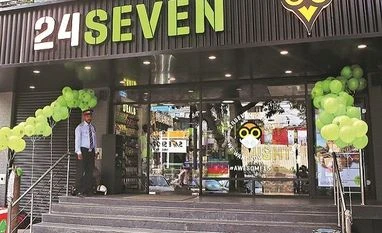For most businesses, the pandemic has been a curse but for Delhi-based convenience store chain 24Seven, it has been a blessing, bestowing a staggering 80 per cent surge in business in the capital.
Since late March, the K K Modi Group venture has seen profits grow by double digits, fuelled by the fact that, with very few stores operational at the start of the lockdown, the dozens of 24Seven outlets proved a lifeline for consumers needing packaged food, hygiene and sanitary items, and cigarettes.
Samir Modi, founder and managing director of the venture, is now hoping to register a healthy 22 per cent growth rate in its top line by the end of 2020-21 to Rs 550 crore, up from Rs 450 crore last year, at a time when most businesses are experiencing plunging sales.
24Seven’s success has not been fortuitous. Steps taken over the past 18 months helped to prepare the way. “Our renewed focus on hygiene and safety and the revamping exercise initiated since early-2019 have played a crucial role,” said Modi.
For most consumer-facing businesses, whether banks or shopping malls, safety and hygiene have become key to survival in the past few months but 24Seven launched contactless backend operations as early as last year. This further expanded the scope of its core principle, namely, offering a safe shopping experience.
“Just offering a bunch of consumer items is not our aim. For that, the neighbourhood kirana store is enough. But it is the experience that we offer, along with convenience, that makes us stand out. Our outlets should be kirana-plus”, said Modi.
Further, to attract more footfalls, the outlets were revamped six months ago to increase the number of merchandise to over 3,500 items. According to Modi, this helped the chain to sustain its growth momentum even after the lockdown ended. Since unlocking began, 24Seven has been registering a year-on-year 20 per cent rise in sales.
The chain may be on top of the immense challenge of the pandemic but Modi faces plenty of difficulties ahead.
Owing to localised lockdowns, only 56 of the 100 outlets are operational round-the-clock. Recent disruptions have led to the offtake of imported or high-value items taking a hit, impacting its margins.
Further, its plans to expand to Bengaluru have had to be postponed till next year. To consolidate its position on its home turf, Modi is planning to add over 20 outlets in the National Capital Region (NCR) this year.
According to Shubhranshu Pani, managing director-retail (India) at JLL, consumers’ familiarity with, and trust in the brand, thanks to its long-term presence in the NCR market, is an asset.
“Building a successful venture in this segment can’t happen overnight, it will take time. Further, the culture of late-night ordering or moving out is a major factor in the success of operators in the 24x7 space,” said Pani.
An invigorated management now plans to open up to 60 outlets in Bengaluru for which it has earmarked Rs 500 crore. It also plans to double its store count in NCR to 180 by March, 2022. Modi aims to have 1,000 outlets across all key metros by 2025 with an Rs 5,000 crore yearly revenue target.
Since 2016, when it revamped its stores and increased their size from 700-1,000 sq ft to 1,000-2,000 sq ft, the chain’s top line has doubled. To aid this growth, 24Seven is launching its own mobile app, renovating the website and has begun home delivery in partnership with Swiggy and Zomato, apart from new offerings.
According to retail experts such as Devangshu Dutta, chief executive, Third Eyesight, even 15 years after its launch, 24Seven remains one of the few successful ventures in the 24x7 retail space.
The failure of competitors like J-Mart led its promoter RJ Corp to exit the business last year. Meanwhile, 7-Eleven, the American convenience stores major from which Modi drew inspiration two decades ago, is yet to take off in India.
In fact, the first 24Seven outlet that opened in Lajpat Nagar central market in 2005 was inspired by a 7-Eleven outlet in Malaysia. Modi’s interest in the business began when the chairman of the 7-Eleven’s Taiwan business persuaded his late father, K K Modi in 2002, to set up a similar venture.
After only three years of rigorous planning with Japanese experts, the idea finally came to fruition.
“It is a very tough business. Just expanding the operating hours does not turn a retailer into a successful convenience chain owner. It requires a completely different skill set,’ said Modi.
Unlock 30+ premium stories daily hand-picked by our editors, across devices on browser and app.
Pick your 5 favourite companies, get a daily email with all news updates on them.
Full access to our intuitive epaper - clip, save, share articles from any device; newspaper archives from 2006.
Preferential invites to Business Standard events.
Curated newsletters on markets, personal finance, policy & politics, start-ups, technology, and more.
)